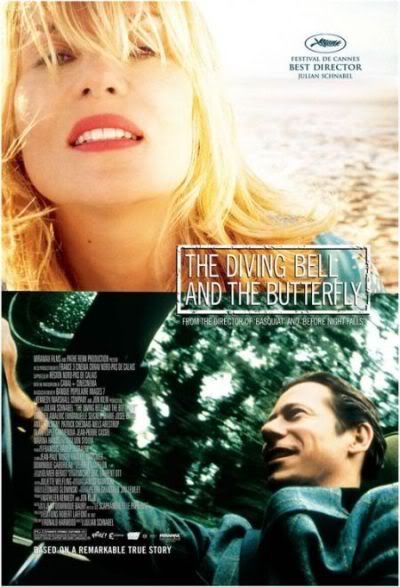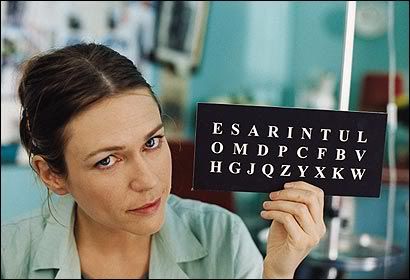(The Diving Bell and the Butterfly)
Directed by Julian Schnabel
Pathé Renn Productions / Miramax Films

Looking back upon the Oscars, host Jon Stewart perfectly nailed it when he asked Hollywood if it needed a hug. Four of the five nominees for Best Picture were quite dark in tone, to say the least (and there were several other near-misses that could have qualified, too - American Gangster, Gone Baby Gone, etc.); only Juno had that sense of humanity to it. Now, don't get me wrong, the other films were fantastic, but generally speaking, there weren't many American films this year that really embraced both the tragedies and the joys of life. In fact, the foreign films over the last few years have been really producing some fine pieces of work in that regard: Amélie, Tsotsi, Les Invasions Barbares, etc., were wonderful testimonies to the power of the human spirit to uplift, to inspire, and to change themselves and connect with others. This French import, The Diving Bell and the Butterfly, is certainly no exception; indeed, I would be so bold as to say that this movie is the all-around finest film I've seen this year.
The Diving Bell and the Butterfly is adapted from the book of the same name. It is the remarkably true memoir of Jean-Dominique Bauby, a man who, suffice to say, led the good life: three lovely kids, a sexy girlfriend, a sweet ride, a book deal in the works, and a position as editor at Elle magazine, which allowed him to hobnob with celebrities like Lenny Kravitz (who provides a brief cameo). His life of comfort, however, is forever altered when he suffers a rare and devastating stroke that leaves him completely paralyzed and unable to speak. Only his left eye remains functioning, and he uses that to communicate with his doctors and therapists. One of the therapists, Henriette Ducard (played wonderfully by Marie-Josée Croze) teaches him how to construct words and sentences through blinking, and Jean-Do, as his loved ones call him, begins to "dictate" his life-story to a writer named Claude (Anne Cosigny).

The directing of Julian Schnabel (who also did the excellent Before Night Falls) is truly outstanding. Much of the story is seen from Bauby's one good eye, so when he awakes from the stroke-induced coma, everything is blurry and out-of-focus. Also, there are times when the characters appear on the edges of the screen, to further accentuate the fact that Bauby cannot even turn his head to get a good look at them. The first-person POV is wonderfully executed, and really gives the viewer a better understanding of what it's like to be entombed in one's own body. Also, there is a definitive beauty to Mr. Schnabel's work. Much of the film was shot on France's north coast, and the beauty of the beaches and seaside villages is utilized quite well, as if to convey that M. Bauby can see all the beauty around him, but it remains quite literally outside his grasp. Indeed, even his nurses and therapists are strikingly beautiful (of course, they are French), and Schnabel cheekily makes Bauby's eye wander south a bit when the women are around. Indeed, it's through Bauby's eye that we truly understand who he was, who he is, and what he thinks of the world. It is simply excellent storytelling.
As much as the directing and cinematography are superb, it is the acting of the cast that really elevates this movie to new heights. Mathieu Amalric is wonderful as Bauby, from his memories and fantasies as a stylish, hip playboy to the surprisingly-expressive paraplegic (or, more kudos to Schnabel for making it appear so). Amalric perfectly conveys the emotions that one would likely face in a similar circumstance: panic, anger, despair, self-pity, and even mocking humor. It is a shame his portrayal was not given the recognition it deserved (hard to argue against this year's Oscar winners, though, I will admit). Also, all of the supporting cast is top-notch in their performances, from Croze as Henriette, who provides great strength for Jean-Do even in tough times, to Cosigny as Claude, who becomes closer to Bauby as she painstakingly takes his dictation, to his ex, Céline (Emmanuelle Seigner), who comes to the aid of the man she still loves. Of particular note is the great, if brief, performance of Max von Sydow as Jean-Do's elderly father. Von Sydow's performance, particularly when "talking" to his son over the phone, is equally astounding and heartbreaking. And yes, he does speak completely in French, and just as impressive, there was practically no accent (and I was a French major - I should be able to tell). Everyone's performance is nearly flawless, showing an expansive range of emotion without becoming melodramatic. Indeed, there is a fair bit of humor in the movie (mainly in Jean-Do's strikingly witty thoughts), which provides that sense of humanity that so often is lacking in today's cinema.
As one of Bauby's old friends tells him, "Hold on to all that is human inside you." This movie indeed embraces all of the human spirit - the pain, the passion, the humor, the sadness, the friendship, and the love - and delivers a beautiful (and true) reminder that even in the most trying of times, one is never truly alone, and nothing is truly out of reach. In an era when violence, scandal, and shocking plot twists are en vogue in Hollywood, it is truly inspiring to see a film that shows us that the best stories are the ones we create with each other.
Très bien fait, mesdames et messieurs, et m-e-r-c-i.

The Diving Bell and the Butterfly is now available on DVD.



No comments:
Post a Comment